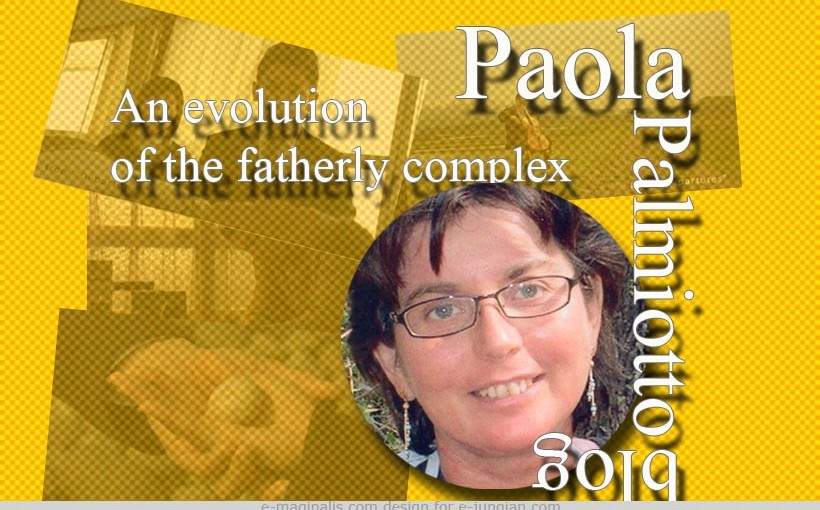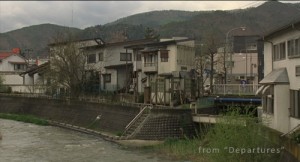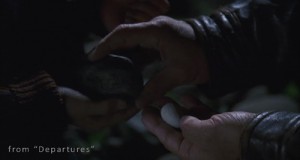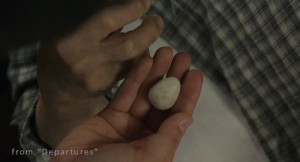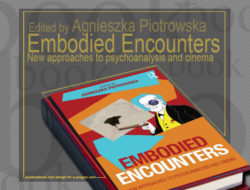A complex is „a set of representations, thoughts, memories, partly or totally unconscious, with a strong emotional charge” (Galimberti, 1992), which limits the freedom of the ego. A kind of black hole that absorbs energy. The film „Departures” (Okuribito in Japanese) by Yojiro Takita (2008 Oscar for best foreign film) is a fine example of how it can evolve fatherly complex. I’m citing excerpts from the film, selected and arranged by theme. Daigo, the protagonist, plays cello in an orchestra in Tokyo. The orchestra is disbanded and he is forced to rethink the choices of his life. He decides to stop playing and to move to his home town to the house inherited from his mother who died two years ago.
The wound
„My mother raised me completely alone,” says Daigo. „My father is nothing but a worm. He ran a small cafe but then fled with the maid and disappeared, an absent father.” And when someone asks him, “who knows what is he doing now?” he says, „He’s probably already been dead for a long time.” „Would you meet him again?” His wife asks him; „I would beat him” responds Daigo.
Daigo talks about his wound. His comments on his father are full of anger.
The lady in the public bathroom confides to Daigo’s wife: „When his parents split up, he had never cried in front of his mother, never, not even once. But when he came here and he was alone in the men’s room, crying, I could see his bony shoulders shaking”. Pain lived alone, not shared, that has dug deep and encysted somewhere. A wound fed over the years not only by the loss of his father but also by his mother’s pain.
The job
Daigo finds a strange jo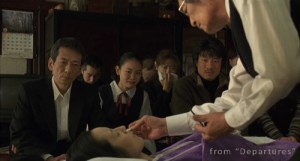 b. What he thought was a job in a travel agency turned out to be the preparation of the bodies for the encoffinment. Okuribito, one who accompanies, who prepares the body for its final journey. At the beginning he is a bit frightened, not sure if he will be able to handle it. Then slowly he understands something important. „Give to the body that has become cold a beauty that will last forever; calmly, with precision, but also with such fondness. Despite the sadness of the last goodbye, what is being made to prepare the deceased, in silence and in peace, is wonderful.”
b. What he thought was a job in a travel agency turned out to be the preparation of the bodies for the encoffinment. Okuribito, one who accompanies, who prepares the body for its final journey. At the beginning he is a bit frightened, not sure if he will be able to handle it. Then slowly he understands something important. „Give to the body that has become cold a beauty that will last forever; calmly, with precision, but also with such fondness. Despite the sadness of the last goodbye, what is being made to prepare the deceased, in silence and in peace, is wonderful.”
Even when friend is telling him „We know… find another job. Aren’t you ashamed to do what you do?” Even when his wife accuses him: „I found out what your job is … But don’t you have even a bit 'of shame? … Couldn’t you pick a normal job? „. And even when his wife leaves him only to return when he will be fired, he remains. He doesn’t go away, conquered by the calmness of his boss.
The boss
His boss is a gentle man of few words, reliable, who becomes attached to him. He met him for the first time at the job interview and said: „I think it was a destiny to lead you here. At least try it. Then if you don’t like it you can always leave.”
When Daigo m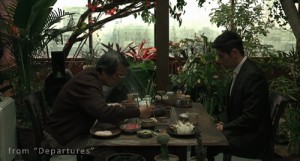 eets him to communicate his decision about quitting the job (after his wife is threating to leave him), the boss welcomes him into his house full of plants. It seems almost a lush greenhouse, as if to compensate with such life for his work so close to death. The employer invites him to the table to taste the flavors of good food and tells him how he began the job: „My wife, she passed away nine years ago. All couples are eventually separated by death… and you are left with great grief. I prepared her for the last trip. She was my first customer. And since then I’ve been doing this job.”… And so Daigo remains.
eets him to communicate his decision about quitting the job (after his wife is threating to leave him), the boss welcomes him into his house full of plants. It seems almost a lush greenhouse, as if to compensate with such life for his work so close to death. The employer invites him to the table to taste the flavors of good food and tells him how he began the job: „My wife, she passed away nine years ago. All couples are eventually separated by death… and you are left with great grief. I prepared her for the last trip. She was my first customer. And since then I’ve been doing this job.”… And so Daigo remains.
They celebrate Christmas together: Daigo, the boss and the girl in the office, with roasted chicken and the sound of the cello. A simple atmosphere, an atmosphere that infuses warmth. During the unfolding of story we are witnessing the birth of a bond between them through small things, small details. The boss, on a symbolic level, is the “good father” that has been found.
The music
There’s the music from the past, the one played in the Tokyo orchestra. About that period Daigo says: „It was a time when the days were just passing, giving life without purpose.”
music from the past, the one played in the Tokyo orchestra. About that period Daigo says: „It was a time when the days were just passing, giving life without purpose.”
The music that, when Daigo gave up his cello, made him say: „It was the most difficult and painful choice in my life. But strangely, when I got rid of the cello, I felt a great relief, as if I had been freed from heavy chains. Perhaps what I believed to be my dream was not my dream.”
And then there is today’s music, one in particular, his father’s favorite: „I got a sudden urge to play the cello. I want to play the cello, to play it and let myself be invaded by memories.”
Memories
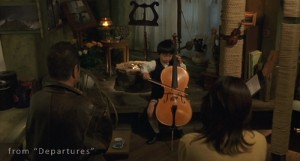 And while he plays his music, memories resurface of playing the cello in front of his mother and his father; and when he exchanged a stone with his father on the bank of a stream. He was a small child then and he couldn’t remember his father’s face; it’s all very blurry…
And while he plays his music, memories resurface of playing the cello in front of his mother and his father; and when he exchanged a stone with his father on the bank of a stream. He was a small child then and he couldn’t remember his father’s face; it’s all very blurry…
The stone letter
So Daigo explains to Mika (his wife) while he gives her a stone 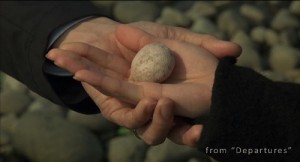 : „In ancient times when men didn’t write, men tried to communicate with a stone. Its shape expressed their feelings and they would give it to another person. Whoever received it, could then understand the feelings of the person who sent it by its touch and weight. A smooth stone meant that you were at peace and happy. A rough and edgy communicated concern for the other person.” It was something that his father had explained to him. That stone wrapped in the score and kept with the cello was a “stone letter” that his father had given him. Daigo comments angrily: „The fact was that we would have exchanged a stone letter every year; at the end, just that one time. That jerk!”
: „In ancient times when men didn’t write, men tried to communicate with a stone. Its shape expressed their feelings and they would give it to another person. Whoever received it, could then understand the feelings of the person who sent it by its touch and weight. A smooth stone meant that you were at peace and happy. A rough and edgy communicated concern for the other person.” It was something that his father had explained to him. That stone wrapped in the score and kept with the cello was a “stone letter” that his father had given him. Daigo comments angrily: „The fact was that we would have exchanged a stone letter every year; at the end, just that one time. That jerk!”
And while listening to his father’s favorite music, he was fiddling with that stone in his hands. He couldn’t break away. 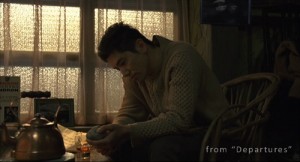 All the energy is there: to hate, but also a kind of special attraction that makes it stay there. It is the unresolved part that absorbs a lot of energy.
All the energy is there: to hate, but also a kind of special attraction that makes it stay there. It is the unresolved part that absorbs a lot of energy.
It is all still there and that is where we must start. The reflection of Daigo watching salmon travelling upstream and asking: „Isn’t it sad? They go back up to die. If they are destined to die why do they struggle so much?” And the passer-by who wisely answers: “they want to return to the place where they were born.” As if to underline that we must return where this part had been frozen, where it created this vortex that swallows energy and does not let it flow freely.
Mika already had a new vision, another possible insight into the history of Daigo’s mother and father. While listening to his father’s favorite music, so she says: „I may be wrong, but I have the impression that your mother has never stopped loving your father… If she had not loved him, she would have thrown away all his records. And they wouldn’t have been so well and carefully preserved.”
Mika returns
Mika returns home unexpectedly, there is something new. She is pregnant and Daigo will soon be a father. While assisting in the preparation of the corpse of deceased public bathroom’s lady Mika understands that fondness of the preparation ritual, a ritual of separation for the ability to say goodbye. „Now I wish that all together we remove from our faces the difficulty of saying our last goodbye to her.” Daigo and Mika understand the importance of the gesture, full of love and respect for the deceased.
A comparison
When the news about his father’s death arrive, the girl in the office reveals her story. She also left her little son to follow another man. „Even I, myself, you know… I left my son in Obihiro. He was six. I fell in love with a man; 'Mother, mother, stay!’ he desperately called me. But I yelled at him to be silent… and I ran away.” The comparison is very hard. Daigo confronts his anger and feelings of other: the pain of who is gone, the remorse of having made mistakes and that she made people suffer, the impossibility to repair. It’s a very strong moment. In order to overcome the armor of anger that has grown over the years, it has to reach high levels of emotional charge. The screams of the girl make a breakthrough in the anger of Daigo. „Please, you must go to him. Stay with your father at least at the end! „Says the girl. What began as a negation, became a possibility. Daigo opens the possibility of the encounter…
The encounter
Even the story of the fisherman reveals that the father arrived alone and was always alone. „I do not know where he came from. He appeared in town one day. He was alone. Here at the port he has alw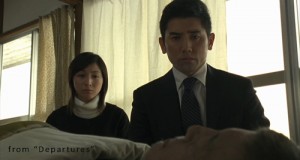 ays been a hard worker. In return for his job he did not ask for nothing more than to live in the cabin of the keepers… It was quiet… it was hard to get a word out of him.”
ays been a hard worker. In return for his job he did not ask for nothing more than to live in the cabin of the keepers… It was quiet… it was hard to get a word out of him.”
Daigo asks: „What meaning did this man’s life ever had? He lived for more than seventy years and all that he leaves is a cardboard box.”
When the morticians arrive, always in a hurry, he stops them and decides to prepare the body himself. And here is the encounter.
His caring gestures led him to discover that his father has died clutching the stone that he, as a child, had given him so many years before. A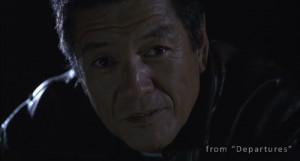 nd all those emotions that remained frozen for years melted, tears came down. Cautiously, with modesty, Daigo finally felt the pain of all that was missing to him and to this man he just met. Little by little the face of his father came together in his memory. The black hole absorbing all that energy was gone, now the energy could flow freely. Now that he met his father again, he will be a father.
nd all those emotions that remained frozen for years melted, tears came down. Cautiously, with modesty, Daigo finally felt the pain of all that was missing to him and to this man he just met. Little by little the face of his father came together in his memory. The black hole absorbing all that energy was gone, now the energy could flow freely. Now that he met his father again, he will be a father.
Reflections
How was this dissolution of the complex possible? The paths are inevitably different; everyone has his or her own. I think that in this beautiful story, so gently told, somehow and somewhere it has been lived through by someone. I think of several aspects:
The crisis, the decision to stop playing in the orchestra, the returning of the cello … „It was the most difficult and painful choice of my life, but oddly enough, as soon as I got rid of the cello, I felt a great relief, as if I had been freed by heavy chains. What I believed to be my dream, perhaps, was not my dream.” Perhaps the choice to make the cello his work was tied more to a ‘need to be’ than something that deeply was.
The return to his hometown, like salmon … „they want to return to the place where they were born.” When there is a black hole in the flow of psychic energy, we must start from the wound that created it, and the native house is the place and the time of his injury.
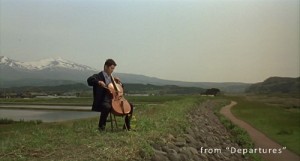 To find in his strange job something that puts him in contact with his deep parts. Perhaps to care symbolically with love and affection about some dead parts, frozen and not experienced, in himself and in his mother.
To find in his strange job something that puts him in contact with his deep parts. Perhaps to care symbolically with love and affection about some dead parts, frozen and not experienced, in himself and in his mother.
The relationship with the boss lived out as an emotional nourishment of his wound, a symbolic good father, which is there to help him find his way in life.
Those are the ingredients to ensure that the encounter is possible. And finally that fog we see in the first scene of the film can thin out to give a clearer view. The energy can flow freely. Often when one dares to approach an understanding, one finds that the reality is not as bad as he had imagined.
Paola Palmiotto
© 2015 Paola Palmiotto – All rights reserved
Tags: father complex, Japanese culture, Movie analysis, Paola Palmiotto













